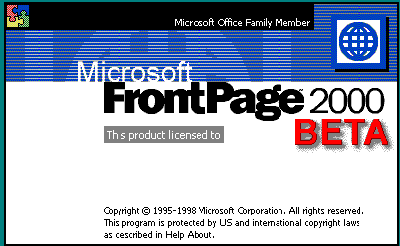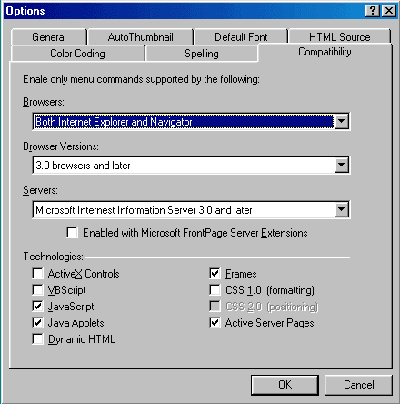
Front Page 2000 - But you will have to wait!
Hold The Front Page !
FrontPage 2000 has just escaped as Beta 1, in fact by the time you are reading this Beta 2 should be out on a much wider release than this version. This version of Microsoft's web development tool has many improvements. A main aim of the development team was for Front Page not to alter your HTML at all, this being a problem that we in this column have commented about on many occasions. Front Page has also 'grown up' with support for teams of web developers to work on a site in much the same way as InterDev, checking out pages for editing and then checking them back in to the site. FrontPage 2000 will also allow users to easily alter Themes and then apply them to their web sites. Editing of Themes can now be done within the main application rather than using the cleverly hidden theme editor which was on the Front Page 98 CD. In fact Front Page 2000 is just one application in appearance - no more Explorer to see the site and then editing the pages in Editor. The whole web site creation is done within one development environment. The interface is so much better now, and much easier to understand for the novice.

Front Page 2000 : - all you need in one screen
Database connectivity has been improved beyond all recognition. Now you have the ability to create connections to databases on your network from within Front Page and to generate, and test, your queries instead of having to go to Control Panel and create a data source using ODBC and then test that from something like Access.

Page Options - Now you can control the beast!
Without doubt the best new addition is the page options screen. This allows you to specify which browsers and what technologies you wish to support both client-side and sever-side. You can now tell Front Page that your server at your ISP does not have Front Page extensions installed and so all the bits that require these extensions will be greyed out. This is a long awaited feature. Many times we have had people designing pages in Front Page who then want to put them into their web space at an ISP only to find that many of the 'clever' bits no longer work. There is also switchable support for Dynamic HTML and CSS (Cascading Style Sheets). However a possible 'gotcha' here is that the very useful Themes either use CSS or Front Page extensions. If for example you use a background from a theme, Front Page does not use the common <body background> tag. Instead it uses a meta tag which is decoded by the Front Page Extensions on the server into CSS. These will only work in IE 4/5 as, even Netscape 4 interprets CSS differently to Microsoft. Microsoft explain this problem in the documentation with Inter Dev 6, the state "Netscape Navigator and Communicator versions 4.0 through 4.03 implement cascading style sheets (CSS) differently than Internet Explorer. Navigator interprets relative URLs as relative to the document rather than to the linked CSS file" . One of the most interesting additions, although not a complete surprise is the inclusion of Visual Basic for Applications, so FrontPage now has a macro language. This could become a real boon to many developers who have to undertake repetitive tasks in order to create or maintain a site. FrontPage200 will also create 'disc-based web sites' which means that a user no longer has to have a webserver installed on their machine to create websites. Obviously many of the server-side technologies would not be available with a 'disc-based' web site, but for many this is not an issue and certainly makes getting started with Front Page even easier, as there is no setting up of a web server before you can start writing pages. Front Page 2000 is certainly a major improvement over '98. We will be returning to this later, so, as they say, 'watch this space'.
Bills or Williams ?
Citibank has joined Microsoft and First Data Joint Venture to form a new company called Transpoint (www.msfdc.com). This Company will provide 'the capability for customers to pay any bill or make any payment regardless of whether the participating biller delivers the bill electronically'. Apparently in the US 19 billion bills are mailed and virtually all are returned with their payment via the mail. Transpoint say that there is a saving of between 50% and 75% over the paper based method when a biller uses the new system. Obviously Transpoint charge the billers a fee to deliver an electronic bill or statement, but this is usually less than the price of a first class stamp. This is America's first end-to-end system for bill delivery and payment via the Internet. No doubt it will be a while before a system like this appears over here, but it will surely come. One hurdle to the acceptance of such a system here is that most households still do not have an Internet connection, even less, one that is permanently connected, so a user would know as soon as a bill arrived via the 'net.
The one permanently connected, information source that most homes do have, however, is their TV set. Digital TV is now here, and about to offer web access via the domestic TV. Mark had the Sky Digital system installed the other day and it is interesting to note that as well as having a modem in the decoder box, so that a dial up connection can be made for the ordering of 'pay to view' films and sports events. There is on the back of the decoder, a standard 9 pin d-type RS232 connector. This is apparently for connecting a home computer, so that emails and data can be downloaded at a rumored 2M bandwidth. The 'up link', which usually only carries small amount of data in the form of URL requests, can be quite slow and is provided by the built in modem, now if this had a fast dial up and connection time like ISDN, then the time spent on the 'phone line could be minimal. BT have already demonstrated that a form of this fast digital dial up can be provided over the standard 'phone lines with their recently launched 'Home Highway' system. The Interactive Digital Service as Sky calls it will not be available until next year, but all Sky digital subscribers are given a discount if they sign up for it now. Should you not want to subscribe to the Interactive Digital Service it will cost you an extra £200 for the Sky Digital TV system. By doing this Sky are making it very attractive to subscribe to both services rather than just the TV programs. Now when this system goes on-line this could be one of the most significant boosts to Internet commerce in this country.
The Web will move from the office and the hobby room, into that most prime piece of advertiserser's real estate, the living room. Now there will be a 'delivery mechanism' in place for the delivery of bills, adverts, news, and information, all straight to the family TV. ? When this happens then many people will have Internet access through their TV, assuming the charges are reasonable. We are now used to the idea of having to pay for our TV with subscriptions, and a license, so why not an on-line charge, preferably built into the standard subscription? However, there is a dark side of this revolution that is already rearing its head with some of the cable companies. The provider, be they cable, satellite, or terrestrial could select which web sites would be available through their system. Fine for some of the more dubious sites to be excluded from granny watching TV in the sitting room, but who decides? The reason being given at the moment for this restriction of coverage is one of bandwidth.
This seems a very strange excuse. A form of censorship of sites, where a pin number has to be entered to access 'adult' sites would, we're sure, be welcomed by the majority and go a long way to reducing parent's reservations about allowing their children to have Internet access, (that and the fear of large 'phone bills!). So long as the entire web was available once the pin number was entered. However, if this censorship were allowed to go unchecked then the web that most people would experience could be at the control of the large media corporations. The censorship that could be applied here, is where perhaps news feeds or articles would be blocked, this would be a serious retrograde step, as the Internet offers us now a source of information free from any censorship. Obviously this brings it's own problems, but control of Internet content for a major group of users by anyone can not be a good idea. We shall have to wait and see how Interactive Digital TV pans out when it launches.
But it will certainly provide the long awaited mechanism for a large number of people to access the web, and with that should come a variety of on-line services. The whole structure of many companies could change as on-line transactions move from the domain of the educational user, computer enthusiast or business user into a large section of the mass market. Digital TV is already delivering on its promises of better picture, sound, and more channels, we will wait to see if it manages to deliver on the promises made for Interactive Digital TV. Already companies like Apple have developed design environments like WebObjects 4 which runs on NT (we will be covering this product in a later article) , which will enable developers to deliver web sites and digital TV content from a common development environment. This is going to be an area that anyone who sells or provides such services needs to watch very closely. It may be a very big slow moving boat but it's still possible to miss it.
Restrictions Lifting
In a move to reduce restrictions on exporting of secure encryption technology, the US government has granted Compaq a bulk license to export 128-bit public-key encryption technology to the banking industry.